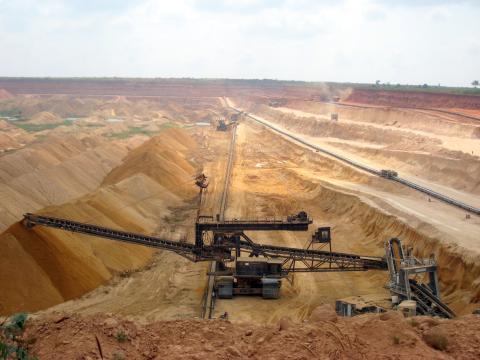
What we learned about the mining sector's priorities for business integrity in times of crisis
Promoting transparent and accountable mining
COVID-19 and government economic recovery policies create business integrity risks for mining companies.
There are several key areas that companies and investors need to pay close attention to.
Business integrity, transparency and anti-corruption are integral parts of ESG performance and affect social licence to operate.
Mining will play a significant role in the COVID and post-pandemic period as countries look to drive their economic recovery via the resources sector, new infrastructure and the energy transition.
Yet mining takes place in some of the globe’s most conflict and corruption-prone countries. Research shows that the licensing phase of new mining projects and expansions is particularly susceptible to corruption given the frequent touchpoints with government and high business stakes.
So, what are the priorities for responsible business in the face of pervasive governance and corruption risks?
This is the question industry leaders and investors discussed in a webinar earlier this month that brought together over 80 participants from mining companies and industry associations.
The speakers included Tom Palmer, President and CEO of Newmont, Christine Ramon, Interim CEO of AngloGold Ashanti, Tim Robinson, BHP Chief Compliance Officer, Namrata Thapar, Global Head of Mining at the International Finance Corporation and Matt Fifield, Managing Partner at Pacific Road Capital.
Strong systems for third party due diligence are more important than ever
Third parties remain a significant source of corruption risk. COVID-19 travel restrictions have made it harder for companies and investors to investigate the culture and commitment of third parties to integrity and anti-corruption. Spending time with third parties on-site is key to understanding their culture.
Those face-to-face conversations and on-the-ground observations are a critical part of any acquisition or investment decision-making process. That might explain why a poll of the participants revealed that almost half considered travel restrictions affecting due diligence to be the greatest integrity challenge created by COVID-19.
For some, COVID-19 has slowed down integrity due diligence procedures. Securing effective environmental and social governance of investments depends on investors having robust systems for business integrity. Target companies and clients must demonstrate their commitment to transparency and anti-corruption.
Specifically, a critical question for investors is to examine how the target company or client secured its licences and permits, including whether any politically-connected individuals work for the company. Mapping out and speaking to the key stakeholders involved in and affected by a mining project is an integral part of due diligence and an ongoing partnership for supporting sustainable development.
Companies need to go beyond compliance and maintain high standards
The second highest rated challenge for business integrity cited in the poll was relaxation by governments of environmental regulations and approvals and fast-tracking of mining projects to attract investment. This has been observed in several countries, including Australia, Brazil and Canada.
Mining companies must be alive to this possibility and maintain high standards regardless of any regulatory rollback designed to facilitate foreign investment. AngloGold Ashanti Interim CEO Christine Ramon told the audience, ‘Companies must not forget that the legitimacy of the permitting process in the eyes of stakeholders can have long-lived consequences.’
This is increasingly important because the growing demand for metals and minerals needed for the energy transition is seeing many companies move into countries with weak transparency and governance frameworks and consequently higher levels of corruption risk.
In the face of higher risks, companies themselves must have strong and robust internal governance to ensure that their policies and standards are not circumvented due to external pressures and changes to the regulatory environment. Staff should feel comfortable raising concerns and feel confident that the issues will be addressed.
Culture and governance start with the board, Newmont CEO Tom Palmer told the audience, ‘Robust boards require independence and diversity in gender and expertise. You won’t get sustainable performance without them.’
The board and management also need to be aligned when it comes to values and culture because it is, after all, the management team who set the tone about the organisation’s culture on a daily basis.
One company’s poor performance can hurt the entire industry
All mining companies – regardless of their size – have a stake in ensuring high integrity standards across the industry. The investor community needs to be asking questions about mining company culture and governance when it comes to integrity – this includes scrutinising board procedures and practices.
With the growing emphasis on ESG performance, and considering licence to operate was voted by mining executives as the top area for business risk for a third consecutive year, this is a message for industry that is hard to ignore.
The business integrity landscape continues to evolve as governments and industry players respond to COVID-19. Mining companies will need to be attuned to the changing levels and nature of risks and ensure that their internal systems and culture will equip them to maintain high standards of integrity regardless of where they do business.
This event was the first in a series of discussions on business integrity in mining organised by the World Economic Forum’s PACI and Mining and Metals Industry Community, the International Council on Mining and Metals (ICMM), the Extractive Industries Transparency Initiative (EITI) and Transparency International’s Accountable Mining Programme.
With a common interest in improving business integrity and anti-corruption practices in mining sector licensing and permitting, the organisations are working together to convene industry players, catalyse dialogue and generate new knowledge and insights to strengthen ESG performance.
This blog was originally published on the ICMM’s website.
Authors
Katja Bechtel/Jörgen Sandström, World Economic Forum
Luke Balleny, International Council on Mining and Metals (ICMM)
Lisa Caripis/Nicole Bieske, Accountable Mining Programme, Transparency International
Andrew Irvine, Extractive Industries Transparency Initiative (EITI)





